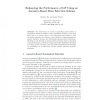Free Online Productivity Tools
i2Speak
i2Symbol
i2OCR
iTex2Img
iWeb2Print
iWeb2Shot
i2Type
iPdf2Split
iPdf2Merge
i2Bopomofo
i2Arabic
i2Style
i2Image
i2PDF
iLatex2Rtf
Sci2ools
121
click to vote
GECCO
2003
Springer
2003
Springer
Enhancing the Performance of GP Using an Ancestry-Based Mate Selection Scheme
The performance of genetic programming relies mostly on population-contained variation. If the population diversity is low then there will be a greater chance of the algorithm being unable to find the global optimum. We present a new method of approximating the genetic similarity between two individuals using ancestry information. We define a new diversity-preserving selection scheme, based on standard tournament selection, which encourages genetically dissimilar individuals to undergo genetic operation. The new method is illustrated by assessing its performance in a well-known problem domain: algebraic symbolic regression. 1 Ancestry-Based Tournament Selection Genetic programming [1] in its most conventional form, suffers from a well-known problem: the search becomes localised around a point in the search space which is not the global optimum. This may be a result of not taking steps to preserve the genetic diversity of the population. A selection scheme in GP may be made to promot...
| Added | 06 Jul 2010 |
| Updated | 06 Jul 2010 |
| Type | Conference |
| Year | 2003 |
| Where | GECCO |
| Authors | Rodney Fry, Andrew M. Tyrrell |
Comments (0)

